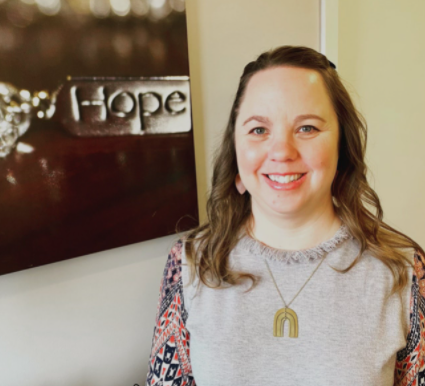Grief work is not only about death

October 2, 2021
She watches the dark-haired woman in front of her break down in tears as memories of the stranger’s late husband flood into her broken mind, eyes appearing tired. Reaching out her hand, the woman listening to her story comforts the fragile widow giving her a soft smile. The two sit in a private room, the walls painted gray matching the woman’s emotions. Grief is hard to imagine until it happens. A feeling my mom is all too familiar with. A feeling she has learned from and yet found her passion from.
People who have never experienced grieving assume that grief is something tragic and heart-shattering. And though it is both, there is so much more to grief that people don’t automatically think about. When telling people I am grieving my sister who died four years ago, almost immediately they feel sorry and pretend they know what I’m going through. This is the most common reaction. But what else have they been told about grief other than that it is tragic and holds a numb feeling? Though grief is a sad and horrible event I wouldn’t wish upon my worst enemy, dealing with trauma isn’t all about the depressing feelings. There are so many amazing and great things about grief that people have zero knowledge about.
My mom knows exactly what those feelings and experiences are. Meet Stephanie Hogan, a mom to five kids, an incredibly passionate human, who loves helping and caring for her friends, family, and strangers alike. Who chose to work in an environment where talking about grief is as normal as talking about the weather.
After 15 years of being a stay-at-home mom to five kids, Hogan felt the need to go out into the world and take a job.
She started off teaching at a local high school but quickly realized that just wasn’t enough. So after getting a call saying they wanted to hire her as director of programming for Starlight Ministries, she just couldn’t pass up the opportunity. After losing a child, and going to Starlight’s many offered grief support groups, she knew her dream job was to work in a field that helped people who were also struggling with grief.
Her first day was over a year ago. “I was nervous but also very excited. I wasn’t entirely sure what to expect or what the job was going to entail. I had been a stay-at-home mom for 17 years and then a part-time teacher after Keyan died. Stepping into the role of a grief worker/Director of grief programming felt like a huge undertaking. Since I have been here, I now realize that everything I have done in my past…the mom role, the caretaker, working in the court system, teaching, etc was all for this moment here at Starlight. I feel like I was meant to work with hurting people and show them that their life can be full again. Being able to listen to people’s hurting hearts is such a privilege. The first day starting something new…let alone in a career that not many people want to work in was nerve-wracking but it has been so rewarding.”
Though she was feeling many contrasting emotions, she knew this is what she had been longing for. Today, after a little over a year, she is frequently sharing how much she loves her job and how thankful she is to have gotten the opportunity she did.
She tells me the many stories of her amazing coworkers who quickly grew to like her as she did them. Staring at my computer, I type away asking her questions,
“Why do you think people make the assumption that grief work is terrible?”
She responds to the email, sitting at her work desk in front of her computer. “In general, Americans would like to believe that death is optional. No one wants to talk about it, no one wants to face their own mortality, and not many people want to be in the mess of emotions that death often brings up.” I know this as a true statement. “So… that leaves most people in our society trying to just avoid the topic altogether. But here’s the thing… Death is one of the only certain parts of life. We will all die at some point and avoiding things we are afraid of never helps anything.”
“Because people tend to avoid the topic, they assume that the work I do is terribly sad or difficult. And it is… death can turn our lives upside down and leave us feeling very disoriented. Why in the world would someone want to work with that all of the time?” This answer bleeds perfectly into the second question, “Why or what do you enjoy working in a place where everyone is constantly talking about grief?” Asking this question was important knowing many people wonder how any person could enjoy working in a job that is focused purely on grief and mourning individuals who have died.
“I am a person who wants to change the world… a helper…much like many of your teachers. I live with grief and believe that grieving people can teach the world how to deal with hurting people. When a topic is uncomfortable we want to move away from it but what people who are grieving most want to do is talk about their person who died. They don’t want to be treated differently. So in my job, I get to help grieving people, I get to educate people about grief so that it is less overwhelming and I get to help the community understand how they can help people they know.”
She finishes with a final thought, “It is extremely rewarding to have people trust me to walk beside them in their grief journey. It is an honor and privilege to listen to their stories and learn from them. My favorite part is watching people grow through their grief because they have been brave enough to sit in the mess of it.”
This answer is not surprising to me but for some, it may take them aback. A second email pops up from Hogan adding on to this answer. “One more reason that I love doing what I do…. Having the opportunity to teach people that they can have a full life again even after someone they love died, is priceless.” I imagine my mom’s eyes as she types her response, a sparkle that shows a small glimpse into how much she is passionate about what is being written.
Clearly, just thinking about death is frightening. Imagine being someone who works in grief support. Hogan gives me a glimpse as to what those scary and hard parts are. “That is a hard question….I always worry about my clients giving in to the sadness of grief and dying by suicide. Many people who are grieving feel very very alone, so it is something that I worry about. I also have to admit that I always worry that I am going to say the wrong thing…which is kind of funny because I teach people how to treat grieving people, but I am still human and mess things up sometimes.”
Lastly, I ask what she has learned from grief that has surprised her. Contrary to what others may think, grief can bring up so many new emotions, hardships, and rewarding moments that are unexpected.
“Grief has taught me that people are a lot more resilient than they think they are. I have also been surprised by how grief can affect a person’s physical body. Stomachaches, headaches, vision changes, low immune response, sleeping issues, etc. If you are someone who is grieving, just know that grief can affect many many different things.”
Hogan has uncovered a lot about grief that she didn’t know herself. Think about how many people are unaware of all of the things grief teaches you and how death can affect so many things.
Grief is truly a beautifully tragic event that can reveal so many things about yourself. A whirlwind of emotions but emotions that truly can be inspiring and teach so many incredible lessons. Stephanie Hogan is a person who has used her grief as a learning tool and into something that is her true passion. A passion she will forever hold close to her heart.




